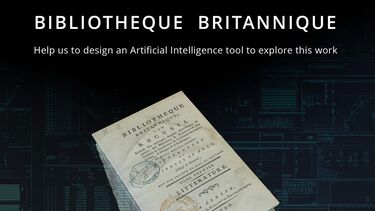Public Evaluation: Biblioth├©que Britannique GenAI Project

Event details
-
from Monday 30 June 2025 - 10:00am to Thursday 3 July 2025 - 5:00pm
Description
Intrigued by GenAI but not yet had a go?
Wondering what the fuss is all about?
Interested in trying it out but not sure how to go about it?
Wondering if it can be of any use to access historical resources?
Then join one of our public evaluation sessions!
WeŌĆÖre running a small number of public evaluation sessions (online) of the exciting new tool we have been developing. YouŌĆÖll have the chance to see the prototype and even try it out to see if it meets your needs!
You may have received an email from us back in March about the public consultation sessions. WeŌĆÖve been working very hard in the past few months to create this tool and while itŌĆÖs not perfect, we are ready to share it with you to test its usability and receive feedback so we can improve it.
The sessions will be online and last about an hour. You only need to attend one. The dates and times are:
Monday 30 June, 10-11am
Monday 30 June, 4-5pm
Thursday 3 July, 10-11am
Thursday 3 July, 4-5pm
To register for a session please fill in this . We wonŌĆÖt be able to keep track of registrations if they are not done through the form.
We really appreciate the continued involvement of those who joined the consultation. WeŌĆÖre also eager to hear from new participants. If you know someone who might be interestedŌĆöwhether from academia, heritage, or the general publicŌĆöplease forward this email to them. Thank you for helping us spread the word!
If you want to find out more about the project, here is a brief description.
So what is this Biblioth├©que britannique project about and why should I care?
Here are three reasons why you might want to engage with this project:
Bringing Forgotten History to Life: Biblioth├©que britannique contains over 70,000 pages of material, including the first French translations of works by iconic authors like Jane Austen and Walter Scott. The project aims to make this content more accessible and to enrich our understanding of European intellectual history.
Cutting-Edge Tech for Humanities: This project is at the intersection of digital humanities and artificial intelligence. By using advanced AI tools and large language models (LLMs), it opens up new possibilities for research and knowledge sharing, making it easier for scholars, educators, and even the general public to explore our shared intellectual history in a modern way.
Relevance to TodayŌĆÖs World: Biblioth├©que britannique wasnŌĆÖt just a literary journalŌĆöit played a key role in shaping political, economic, and social discussions, much like the role of media and publications today. It helped promote scientific ideas, education for women and the middle class, and even shared revolutionary concepts like vaccination or climate science. Its lessons can inform our ongoing debates about nationalism, education, and knowledge accessibility.
This project is a collaboration between Dr. Karine Zbinden (MLTC), Professor Adam Piette (School of English), and Mr Edwin Brown (Computing Science), with funding from the Engineering and Physical Sciences Research Council (EPSRC). By combining modern AI techniques with historical scholarship, the project will develop a tool to make this vast resource accessible to a wide range of usersŌĆöfrom scholars to audiences in the GLAM (Galleries, Libraries, Archives, and Museums) sector.
In a time of rapid changes, itŌĆÖs exciting to think that we can use technology to revisit history and learn from it in fresh, interactive ways. What weŌĆÖre building here isnŌĆÖt just a tool for academics, itŌĆÖs a bridge between the past and the presentŌĆöa way for anyone, anywhere, to dive into a critical moment in European history.
WhatŌĆÖs a public evaluation and who can take part?
If youŌĆÖre not sure what a public evaluation is or whether you can/should attend, here is some more information about the process. There is no need for any prior experience or knowledge to take part. Quite on the contrary! As we are building a tool that the general public will be able to use, we are simply asking potential users for their feedback so that we can make sure that itŌĆÖs a really useful tool that provides an engaging experience. ThatŌĆÖs why we need you!
